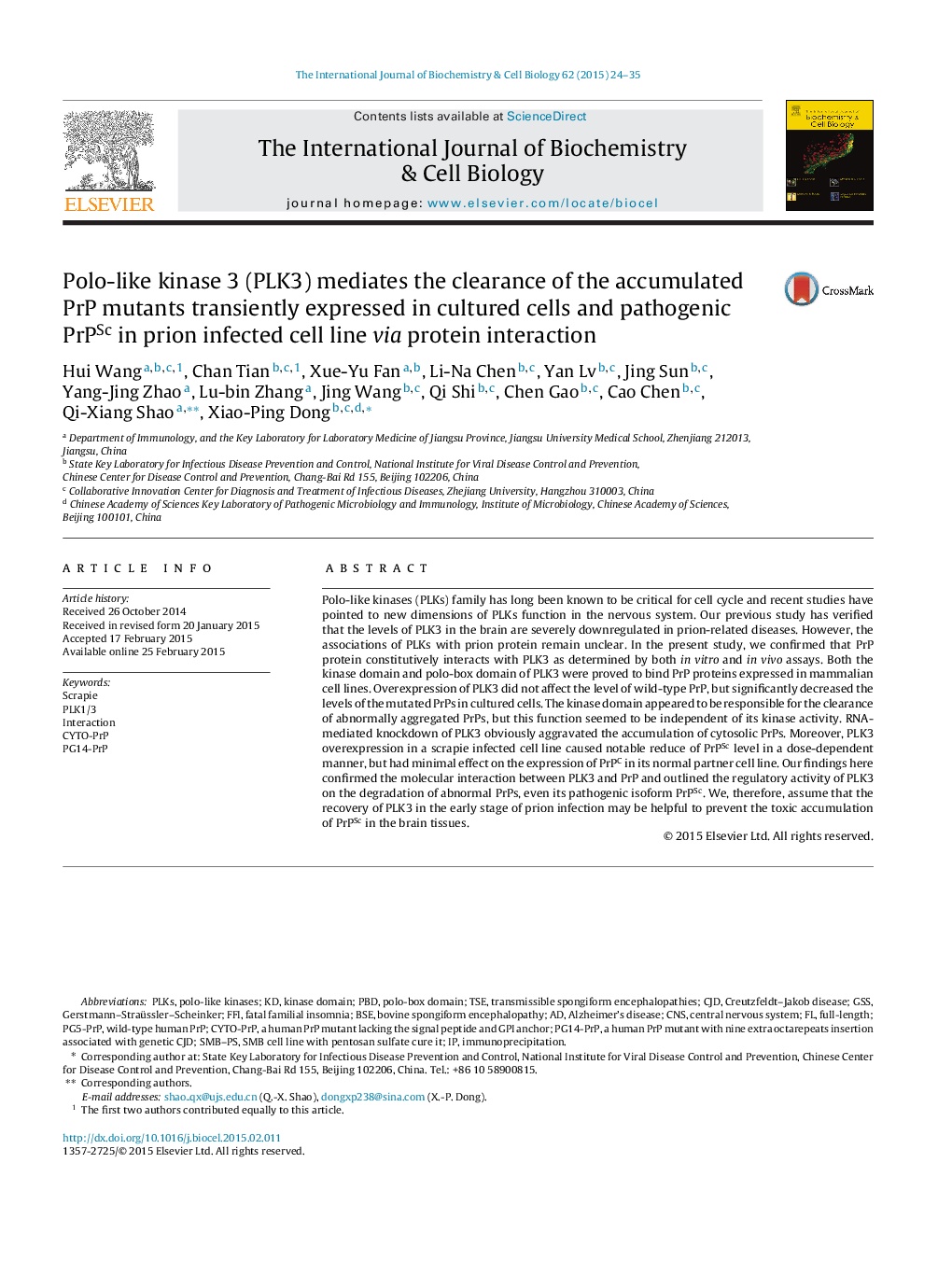| کد مقاله | کد نشریه | سال انتشار | مقاله انگلیسی | نسخه تمام متن |
|---|---|---|---|---|
| 8322722 | 1539882 | 2015 | 12 صفحه PDF | دانلود رایگان |
عنوان انگلیسی مقاله ISI
Polo-like kinase 3 (PLK3) mediates the clearance of the accumulated PrP mutants transiently expressed in cultured cells and pathogenic PrPSc in prion infected cell line via protein interaction
دانلود مقاله + سفارش ترجمه
دانلود مقاله ISI انگلیسی
رایگان برای ایرانیان
کلمات کلیدی
BSEGerstmann–Sträussler–ScheinkerPBDFFICJDGSSTSEInteraction - اثر متقابلScrapie - اسکرپیTransmissible spongiform encephalopathies - انسفالوپاتی های اسپگوماییک قابل انتقالFatal familial insomnia - بی خوابی خانوادگی مرگبارCreutzfeldt–Jakob disease - بیماری Creutzfeldt-JakobAlzheimer's disease - بیماری آلزایمرfull-length - تمام طولBovine spongiform encephalopathy - جنون گاویPolo-box domain - دامنه پولو جعبهkinase domain - دامنه کینازCNS - دستگاه عصبی مرکزیcentral nervous system - سیستم عصبی مرکزیPolo-like kinases - کیناز های پولو مانند
موضوعات مرتبط
علوم زیستی و بیوفناوری
بیوشیمی، ژنتیک و زیست شناسی مولکولی
زیست شیمی
پیش نمایش صفحه اول مقاله

چکیده انگلیسی
Polo-like kinases (PLKs) family has long been known to be critical for cell cycle and recent studies have pointed to new dimensions of PLKs function in the nervous system. Our previous study has verified that the levels of PLK3 in the brain are severely downregulated in prion-related diseases. However, the associations of PLKs with prion protein remain unclear. In the present study, we confirmed that PrP protein constitutively interacts with PLK3 as determined by both in vitro and in vivo assays. Both the kinase domain and polo-box domain of PLK3 were proved to bind PrP proteins expressed in mammalian cell lines. Overexpression of PLK3 did not affect the level of wild-type PrP, but significantly decreased the levels of the mutated PrPs in cultured cells. The kinase domain appeared to be responsible for the clearance of abnormally aggregated PrPs, but this function seemed to be independent of its kinase activity. RNA-mediated knockdown of PLK3 obviously aggravated the accumulation of cytosolic PrPs. Moreover, PLK3 overexpression in a scrapie infected cell line caused notable reduce of PrPSc level in a dose-dependent manner, but had minimal effect on the expression of PrPC in its normal partner cell line. Our findings here confirmed the molecular interaction between PLK3 and PrP and outlined the regulatory activity of PLK3 on the degradation of abnormal PrPs, even its pathogenic isoform PrPSc. We, therefore, assume that the recovery of PLK3 in the early stage of prion infection may be helpful to prevent the toxic accumulation of PrPSc in the brain tissues.
ناشر
Database: Elsevier - ScienceDirect (ساینس دایرکت)
Journal: The International Journal of Biochemistry & Cell Biology - Volume 62, May 2015, Pages 24-35
Journal: The International Journal of Biochemistry & Cell Biology - Volume 62, May 2015, Pages 24-35
نویسندگان
Hui Wang, Chan Tian, Xue-Yu Fan, Li-Na Chen, Yan Lv, Jing Sun, Yang-Jing Zhao, Lu-bin Zhang, Jing Wang, Qi Shi, Chen Gao, Cao Chen, Qi-Xiang Shao, Xiao-Ping Dong,